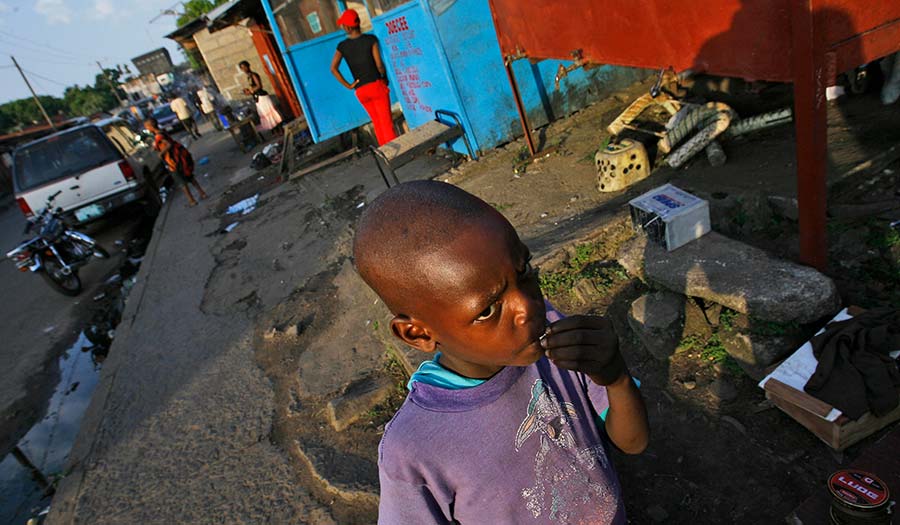 AP/Jerome Delay
AP/Jerome Delay
World News Desk
Learn the why behind the headlines.
Subscribe to the Real Truth for FREE news and analysis.
Subscribe NowLOUISIANA, Liberia (AP) – Liberia is celebrating two major anniversaries this year—200 years ago freed slaves from the U.S. arrived here and 25 years later they declared the country to be independent.
Amid the festivities for Independence Day on Tuesday, many Liberians say the West African country’s promise is unfulfilled and too many of its people still live in poverty.
“Liberia has gone backward 50 or more years,” says Richard Cooper, a 67-year-old farmer in Louisiana township, outside the capital, Monrovia.
“We have had government after government, people coming into and going out of power, doing their own things without consulting or satisfying the masses,” he told The Associated Press on a dusty road in front of his two-roomed home.
“We put governments in power so that in return they will meet some of our needs, but now the masses are suffering,” Mr. Cooper said, munching on popcorn. “Liberia should have been a better country if leaders had the country at heart. Money is here; but where is it going? Into the pockets of a few.”
Nearly 20 years after the country’s back-to-back civil wars killed an estimated 250,000 people between 1989 and 2003, Liberia’s children still yearn for an opportunity to go to school, he said.
Information minister Ledgerhood Rennie, however, said that major celebrations for these anniversaries are necessary to build national pride and honor the work of many to establish the nation.
“This country has a rich history…Liberia stood as the pedestal for black independence south of the Sahara…other nations of black people were looking up to Liberia as a glowing nation on the continent of Africa,” Mr. Rennie told AP as he oversaw preparations in the national stadium for the independence celebrations.
The United States has had a lasting influence on the West African country. Liberia’s flag, constitution, form of government and many laws are modeled on those of the U.S. The capital is named in honor of America’s fifth president, James Monroe, who was in power when the freed slaves were repatriated.
The ex-slaves established an oppressive regime that ruled the indigenous population with an iron fist from the time of their arrival until 1980, when indigenous soldiers led a military coup against President William Tolbert. Tolbert—whose family migrated from South Carolina in the 1870s—was gruesomely murdered by the rebelling soldiers.
The prolonged trauma of the civil wars followed and then the rule of Nobel Prize-winning President Ellen Johnson Sirleaf.
A persistent problem has been corruption, which many say is largely responsible for the underdevelopment and poor economic growth of an otherwise resourceful country of less than 6 million people.
U.S. Ambassador Michael A. McCarthy was blunt in a speech earlier this year.
“We would not be good stewards of U.S. taxpayers’ money, nor would we be good partners to Liberia, if we sat quietly and said nothing as misgovernance and corruption continued with impunity,” he said.
U.S. Ambassador to the United Nations and former U.S. Ambassador to Liberia, Linda Thomas-Greenfield, in a recent comment about Liberia, said: “Corruption is an act of robbery, plain and simple. It’s a cancer in our societies. It is government stealing from the people of Liberia, from the mouths of children…Corruption is a democracy killer, and we cannot have that in a place like Liberia, which we’re counting on as a bulwark for Africa’s democracy.”
International soccer star-turned-president, George Weah, has been accused of not living up to key campaign promises that he would fight corruption and ensure justice for victims of the country’s brutal wars.
Midway into its fifth year, the Weah government has so far failed to attract foreign direct investments. Youth unemployment is stubbornly high and public institutions are faced with enormous challenges. Healthcare is almost non-existent, as Mr. Weah and officials come under frequent criticism for amassing wealth and building expensive properties.
Mr. Weah denies the accusations, saying his government is delivering well on promises.
- Real Truth Magazine Articles
- AMERICAS
 How Haiti Endures
How Haiti Endures
More on Related Topics:
- 755,000 People at Risk of Famine in Coming Months in War-torn Sudan, Experts Warn
- Jihadis from Africa’s Sahel Have Crossed into Nigeria’s North, a New Report Says. A Lot Is at Stake
- The UN Says More Than 10 Million People in Sudan Have Now Fled Their Homes as War Continues
- The West African Sahel Is Becoming a Drug Smuggling Corridor, UN Warns, as Seizures Skyrocket
- Sudan’s War Began a Year Ago. Children Are Among Its Most Fragile Survivors


